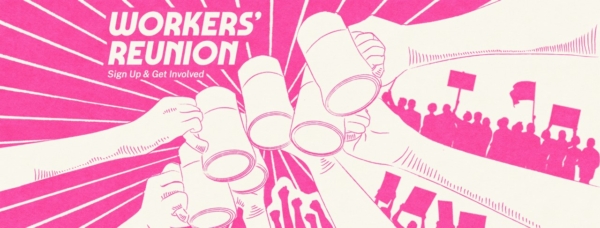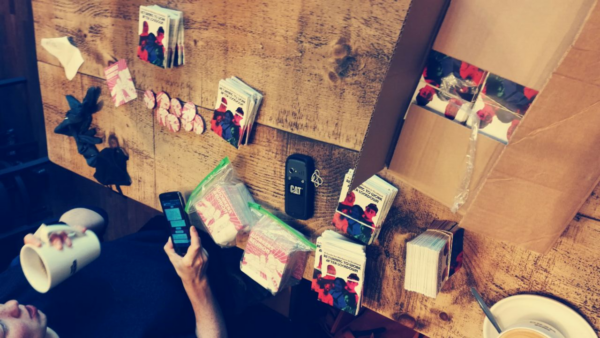Worker’s Reunion
This month, many businesses in Scotland’s hospitality, retail, and tourism sectors are reopening. This means many workers are returning to work under fraught conditions. Over the past year, they have experienced a plethora of exacerbated labour issues, including insecure employment, unsafe workplaces, and abuse from customers. These were problems pervasive to these sectors before the pandemic, but the tension of enforcing mask rules and the uncertainty around furlough and government support for these sectors has made them worse.
The Workers’ Reunion aims to strengthen workers’ collective power in these sectors. Run by Better than Zero and supported by Unite Hospitality, the Call Centre Collective, the Cineworld Action Group, and the STUC, it involves two days of action in different cities across the country– Edinburgh, Glasgow, Dundee, and Aberdeen– on the 8th and the 15th of June. During these days, volunteers will be visiting workplaces on high streets to distribute literature and talk to workers about how to organise.
Amy Tait Westwell is one of the organisers of the campaign. She’s a historian of political thought looking at radical tactics through history, and she’s been involved with Better than Zero for a few years. The campaign came out of the way many employers responded to the pandemic. In the interval between rumours of a UK lockdown and the announcement of the furlough scheme, the usual problems workers contacted Better than Zero about — unpaid wages, no holiday pay, workers being made redundant — were suddenly overtaken by covid related tactics: “employers were acting incredibly fast — getting all their staff to sign zero-hours contracts the minute they came into work, or suddenly firing people”. Amy trained some volunteers and they began to help workers tackle these issues. “There were a few groups of workers who did really well early on – like the PURE Beauty Salon workers in Silverburn who avoided signing new contracts, collectivised, and ended up on furlough. So that was very encouraging.”

On the back of this work, they trialled the first Workers’ Reunion campaign to give workers the tools to organise against fewer hours and more insecure contracts. They received positive responses and gathered information about the ways employers were shirking responsibility. Over the summer, they had delivery couriers involved in the same kind of work. Amy comments on the way that couriers, often thought of as particularly atomised and difficult to organise, can play a central role in these kinds of drives: “Couriers are incredibly well-placed to be organisers because they come into contact with restaurant staff all the time, and cover loads of workplaces every week. They are like your classic roving organisers from the late 19th century and early 20th century.”
This spring, the campaign is more organised with higher participation. Their aim is to get people thinking about the collective power they have as workers and to give them the courage to use that power. This doesn’t necessarily mean joining a union: “Even having a workplace WhatsApp group that your boss isn’t in is a massive step to being able to look after each other. Letting your colleagues know that you have their back can completely change a workplace environment. In Better than Zero we’re often organising retrospectively – a boss has made a move against workers, and we’re scrambling to get people together and work out what to do. The collective should come first, even if it’s not clear yet what it’s for.” Getting workers to think about this entails talking to them about any workplace concerns they might have, and often following up with support for how to address them.

Amy notes that, though the pandemic has aggravated already poor working conditions for many people in these sectors, “there’s also a moment of opportunity. There’s a hiring crisis – bosses can’t find workers. When there’s a shortage of workers, workers have more power. Typically such a shortage results in wage increases. All the conditions are right – so we need to push now to change things…Post-lockdown, the work environment can either be reframed by bosses, or by workers. It’s a moment of rebuilding, and people don’t want to go back to the situation we had before.”
This is a crucial time to strike for workers interested in organising. Amy references the recent election: “everything stayed the same. If there’s going to be change in the next few years, it’s going to come from people organising, not from parliament. At some point in the future, there’ll be a[n independence] referendum. We should be aiming to go into the referendum period with a workforce organised in strong collectives and with real energy among the people. I’m thinking of groups like Living Rent as well.”
In this way, the Workers’ Reunion campaign is an excellent example of the possibilities of organising beyond trade unions, which is an increasing necessity with the changing nature of the workforce in Scotland. Amy notes that “Scotland has a strong history of workers collectives, but the culture has faded. Now workers are building a new culture of collective strength, one fitted for our modern nation.” She mentions other similar projects across the country– the Workers Observatory, the Cineworld Acton Group that started in Glasgow and now supports workers all over the UK, and Call Centre Collective. “I just want to see more of this, in more sectors, and more workplaces.”
Get Involved:
To get involved with the Workers Reunion tomorrow, fill in this form.
If you can’t make it, fill in the form anyway, and they’ll let you know about their ongoing organising programme run through the Society of Cadies, which encourages organising as a way of life.

So an Amy Tait Westall (a historian of political thought) along with the author (whos a PHD student) is telling us to ‘get down with the workers’.
Yeh right…….. get those barriers up in Morningside.
You should watch Bambi and watch out for this:
“.If you can’t say something nice, don’t say nothing at all”. – Thumper’s mother.
People have been, are being and will be shafted by employers using Covid as an excuse. An historian and a PhD, or not, they’re trying to help.
If all you’ve got is badly punctuated naysaying, perhaps you’d have served yourself better by resisting the urge to comment?
*PhD student*
So a worker cannot be a PhD Student or a historian? Many advances for the “working class” were inspired by the thoughts of intellectuals. And these two are doing something.
If only there was a political party which had a prolonged period in Office which could have reversed all the damage done to the Unions/workers rights by Thatcher and the Tories .
Imagine if we had Union leaders who were more concerned with workers’ rights rather than their own advancement or political careers .
What if we had a Union which stood up for women as well as men and bargained for equality in their pay and conditions .
James, there was one and it refused to change anything. Blair’s Labour government was a DISGRACE IN UNION TERMS. I led the last official work-in in Scotland. After it ended Thatcher changed the law ensuring that work-ins were illegal. Blair refused to change things back. TULRA has been ignored or jettisoned. The latest Tory wheeze will see any legitimate gathering, trying to protest in public, peacefully, subject to arrest and dispersal. We are moving to a police state.
Bill
Tongue-in cheek , Bill !
This is a very important initiative.
I can see from my childrens’ work “careers” ( in bar work, retail, fast food, seasonal horticulture, hospitality) that they have no conception of an organised work force. Both in their 20’s, they don’t know what a union is, or was, and have no idea that they, as workers, might actually have some power…if only they would organise.
The fact that this “Re-union” work has to be carried out semi-covertly via What’s App groups and travelling couriers spreading the word demonstrates just how far backwards we have regressed. Imagine the impact of a city-wide Barristas strike at 8am on a Monday morning in London.
Time to reclaim the power of the worker.